
The King Loves Us Museum (Chalermprakiat Building 5, 1st floor)
Zone 1
The Royal Ploughing Ceremony
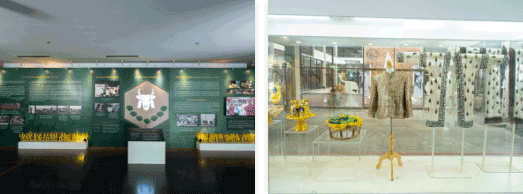
A traditional ceremony to honors the bond between the King, the government, and the farmers and to emphasize the importance of agriculture in Thai society. In addition, to give moral support to the farmers who sustain the country. and to mark the beginning of the rice growing season of each year.
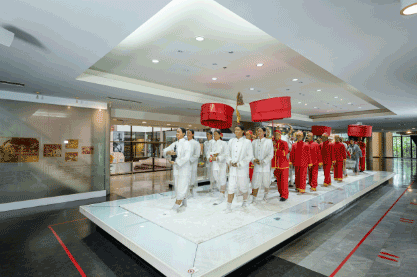
The Royal Ploughing Ceremony
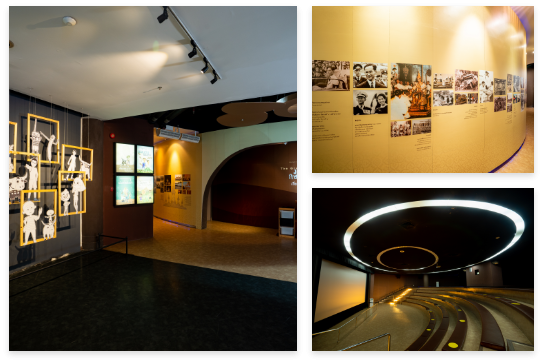
Zone 2
3D Theatre (8 animations)
Zone 3
3) 23 royal principle : The Path to Success
- Systematic Data Gathering
When His Majesty King Rama IX initiated any project, he first studied relevant documents and maps extensively and systematically. He also consulted officials, academic staff and people in the area to obtain the most accurate picture of the situation in order to provide appropriate assistance to meet people’s needs in a timely manner.
- Dynamism from within
Community development must focus on preparing the people and families in the target community for development before they interact with the outside world. Bringing in funds and ideas, before people have had sufficient opportunity to prepare for change, may find them unable to adapt or cope with changing trends and potentially lead to the collapse of the community.
- Start to tackle a small point of a problem (micro focused)
His Majesty King Rama IX always looked at the overall context of a problem (macro), but his solutions started from a small point (micro) overlooked by most people. “….If we have a headache, we are not able to think of anything. So we must fix the headache first ... It doesn't actually solve the real cause of the symptoms. But we must eliminate the headache so that we are able to think.”
- Work Step by Step
“…….Country development needs to be achieved in sequential steps. The basic principle is that subsistence needs of most people in the country must first be met by utilizing all means and equipment appropriately and economically to form a sound foundation. Once we have a solid foundation, we then gradually develop prosperity and the higher economic status in the next step. Focusing only on creating wealth and hastily raising the economy without action plans in tune with the state of the country and the people, will cause disparities and inequities.”
- Geosocial-Based Development
“……..Development must be consistent with the geographical and social context including the tradition and characteristics of the community. We can't force people to change way of thinking. When we assist or advise people, we should not force them to think the way we do. But we must find out what they really need before we explain and help them to understand the principles of development- and that will be of great benefit for all….”
- Whole Picture (holistic)
When His Majesty King Rama IX initiated any new project, he looked at things in a very systematic and integrated way. He understood the dynamics and dimensions of every issue before proposing a solution or options to pursue.
- Do not stick to the Textbooks
His Majesty King Rama IX’ s principles of work aim to ensure that developments are mutually beneficial and aligned with natural and environmental conditions as well as social conditions and social or community psychology. Development work should not be tied rigidly to academic books or technology unsuitable for practical, real-life conditions. That is "do not stick to texts."
- Economy, Simplicity Maximum Benefit
His Majesty King Rama IX’ s principles of solving problems efficiently and economically include using simple technology, materials and resources that are available locally so that the people themselves are able to achieve solutions. As one of the royal saying proclaimed "...plant forests without planting, and let nature take its own course, allowing the forest to grow naturally so as to save cost.
- Simplifying complex matters (make it easy)
His Majesty King Rama IX invented, adapted, improved and modified country development works so they could be easily implemented. And most importantly, this was always in line with living conditions, the overall ecosystem as well as the social conditions of the particular community. He solved the problem by applying laws of nature, simplifying difficult and complex issues. The term "make it easy" is therefore an important principle of country development through various royal initiative projects.
- Participation
His Majesty King Rama IX was a democrat and took account of the opinions and needs of the public. He encourage all concerned parties, the public and officials at all levels to come together to express their opinions and work together on the Royal Project. "Public hearing", a simple and straightforward process, was introduced in the management of operations. In beginning any project, he would explain its necessity and impact to all parties including local community leaders. Accordingly, royal initiatives project would be implemented only when the people in the specific area agreed with the project and the relevant governments agencies were ready to implement it
- Common benefit (public interest)
“Common benefit” is the major concern of King Rama IX. In 1971, in a royal speech at Khon Kaen University the King said “...People keep saying we should sacrifice for the public and think of the public benefits as a priority. This sounds boring and may be even annoying. Thus, some people may think ‘What’s in it for me then if I keep giving to the public?’ Well, let me remind you that those who give in the public interest do so not only for the public, but actually for themselves to eventually gain benefit from the public”
- One – Stop Service
His Majesty King Rama IX designated the Royal Development Study Centers as a models for a comprehensive “One Stop Service” where various government agencies pitch in together to operate and serve the people at a single place. The “one stop service” would benefit the visitors in terms of time and cost saving for those who wish to use government services in those centers.
- Nature is Its Own Doctor (Nature Naturally Fixes Nature)
King Rama IX had a deep understanding of nature and wanted his people live closely to natural resources. He thoroughly investigated problems of nature. If we want to fix nature, we must use nature to help. For example, his initiative to solve forest degradation problems was "Reforestation without planting trees” but allowing nature to help its own restoration. Or "3 kinds of reforestation 4 benefits", e.g. planting commercial trees, fruit trees and firewood – the additional benefits of which help provide moisture to the soil and enable people to live sustainably with the forest.
- It Takes Evil to Fight Evil
The laws of nature are used as important principles and guidelines to solve problems and restore unusual conditions back to their original conditions. For example, diluting waste water with clean water to turn it into good quality water in accord with the natural tidal currents.
- Planting Forest in People’s Hearts
Humans consume and use natural resources wastefully for survival and for their own benefit, which causes damage to the environment. Therefore, in order to restore natural resources, people must first develop a consciousness of and love for the forest. As one of the royal sayings proclaimed, "…..Forest staff should plant trees into the hearts of people first, then those people will themselves plant trees on the land and nurture the trees.”
- Our Loss Is Our Gain
“The loss is actually the profit. Apparent losses are undertaken so that the country can progress. And that people are happy cannot be counted in money... " the principle of His Majesty King Rama IX in a royal speech to the Thai population. "Giving" and "sacrifice" are actions that are profitable. The gain is clearly reflected in the well-being of the people.
- Self – Reliance
This concept aims to assist people to live in society and its environment to eventually become “self reliant”. As one of the royal sayings proclaimed, "...helping and supporting people to make a living is extremely important. If those with moderate living conditions begin to rely on themselves, they will surely be able to achieve a high level of prosperity in the next step….”
- Sufficient Living (live well, eat well)
His Majesty King Rama IX thoroughly understood that there were many factors causing his people to fall into a cycle of misery. He then provided assistance for them to first achieve a reasonable living condition, and thereafter, to increase their competency and make further progress.
- Sufficiency Economy
The philosophy of "Sufficiency Economy" is a middle path of conduct in development and administration for people at all levels, families, communities and national (country to keep pace with the force of globalization. "Sufficiency" means modesty and reasonableness, including the need to have strong robust (self-protection system ) which requires the application of knowledge with due consideration and care.
- Loyalty, Honesty, and Sincerity
"...only those who are honest, determined and committed will accomplish important and beneficial tasks. .. " the royal speech on 12 July 1979 "... those who are honest and sincere but with little knowledge may contribute more benefit to the public than those who are very knowledgeable but without honesty and sincerity ... " The royal speech on 16 March 1990.
- Work with Happiness (Work Happily)
His Majesty King Rama IX’s ultimate happiness derived from helping his people. As he once said, “…..working with me…. I have nothing to give you, except shared happiness derived from helping others.”
- Perseverance
The royal writing, “King Mahajanaka” is an allegory. His Majesty King Rama IX wanted Thai people to read, study, analyze and follow the example of King Mahajanaka. King Mahajanaka, a determined and tenacious monarch kept swimming even though he couldn’t see the shore. If he didn’t so persevere, he would have become food for the fish in the ocean and would not have met with the angels who came to rescue him from drowning. Similarly, in the early stage of King Rama IX initiative development projects, there was little progress or readiness for work. But he was not discouraged by that. Instead, he, with his own money, was so determined, committed and worked very hard to develop the country and to achieve well being and happiness for his people. With his own money.
- Knowing, Loving and Unity
King Rama IX frequently declared a valuable and insightful guideline “Knowing, Loving and Unity” Knowing : before taking any action, we must know the problems, know the factors and know how to solve the problem. Loving : when we have thorough knowledge, we also need to have love or passion to act (to solve the problem) Unity : bear in mind we cannot work alone but must work together as a team to solve the problem efficiently.
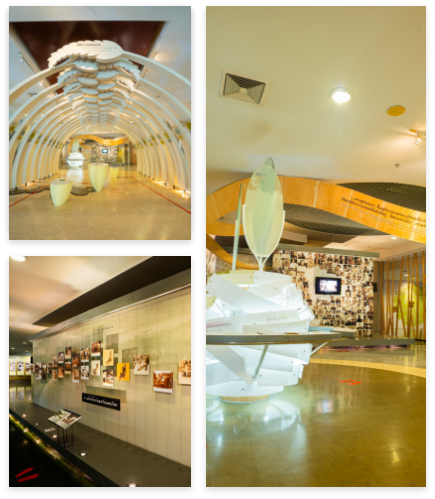
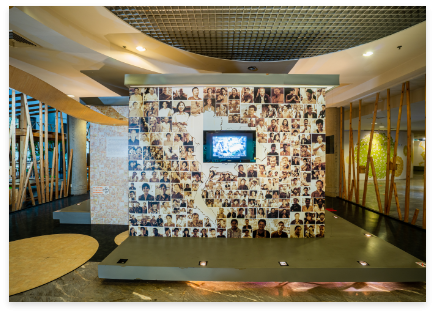
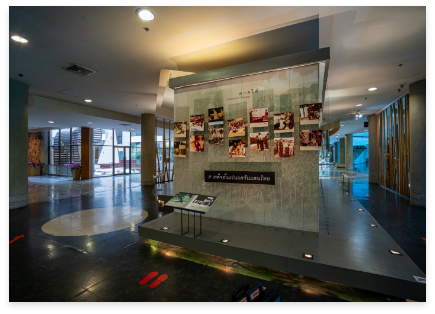
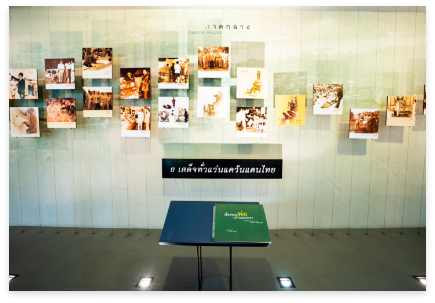
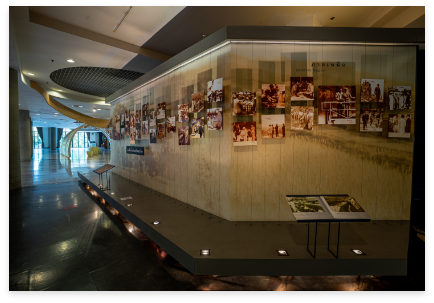

Zone 4


 en
en th
th ch
ch

